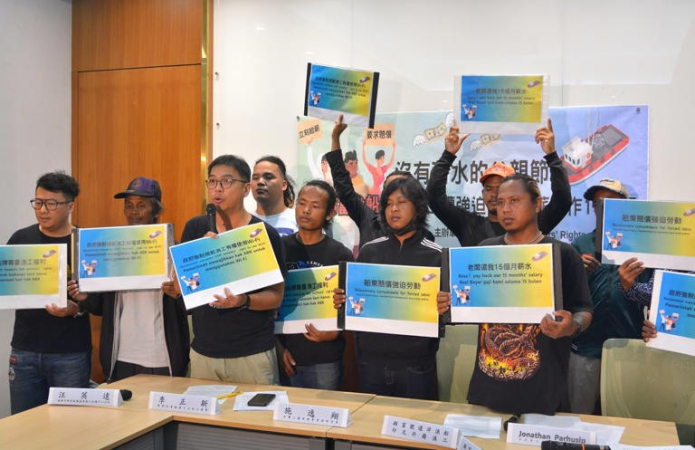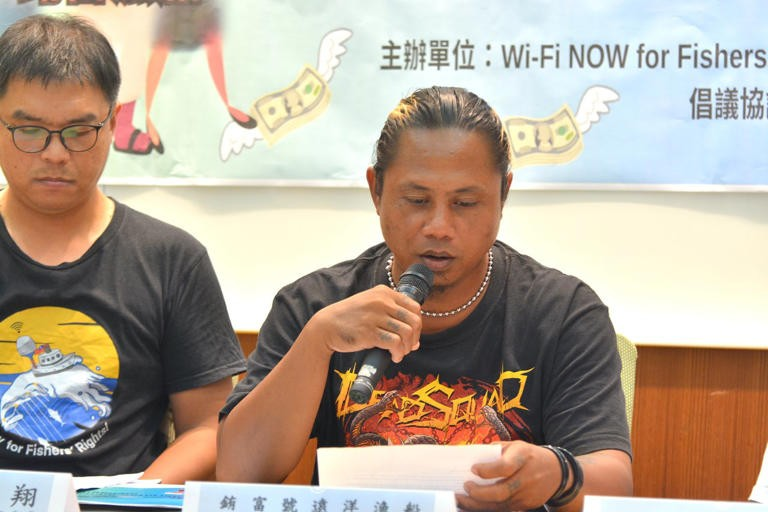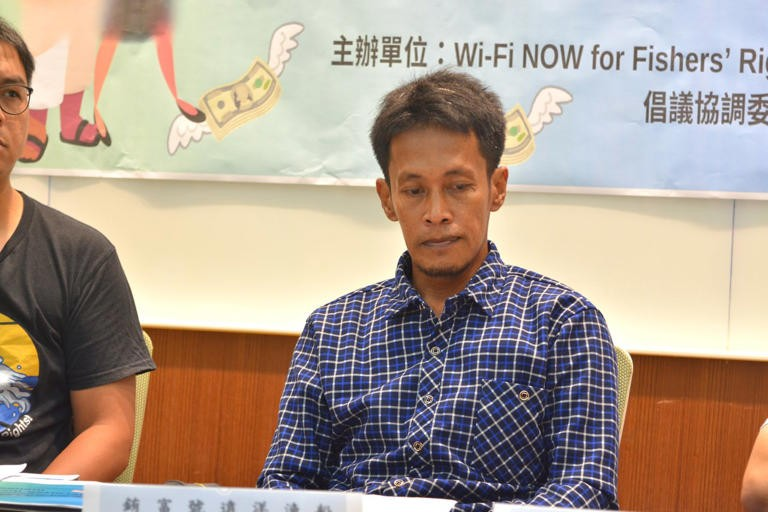
Ten Indonesian fishermen working on Taiwan's distant-water fishing vessel "You Fu" have been owed wages for up to 15 months, with a total outstanding amount of approximately USD 80,850 (about NTD 2.62 million). On the day before Father's Day (8/7), several civil groups, including the Taiwan Association for Human Rights, the Donggang Indonesian Fishermen Friendship Association (FOSPI), and the New Immigrant Labor Rights Service Center, held a press conference condemning this issue and demanding that the Taiwan Fisheries Agency assist the fishermen in recovering their wages and compensation, and punish the employer for illegal actions.
Masduki Priyono, a fisherman on the You Fu, stated, "No one can accept working on a distant-water fishing vessel for over a year without receiving any wages. We hope that by sharing our experiences, the Taiwan government will implement effective and meaningful policies to prevent such incidents in the future and punish employers who illegally mistreat fishermen, to ensure that other foreign workers do not face the same predicament."
The Fisheries Agency responded that the employer had promised to settle the wages with the fishermen by 8/9; if not completed by the deadline, the agency would use the guarantee deposit of the intermediary to compensate the fishermen. The Fisheries Agency stated that it would handle the matter prudently and protect the rights of the fishermen.
Taiwan's Distant-Water Fishing Industry's Infamous "Sweatshop Seafood"? Indonesian Fishermen Accuse of Being Owed Wages for Over a Year
Starting in mid-April last year (2023), ten Indonesian fishermen began working on Taiwan's distant-water fishing vessel "You Fu" for 15 months, fishing in American Samoa. During this period, they could not contact the outside world due to the lack of WiFi on the vessel. After the You Fu docked in Taiwan on 7/15 this year, the fishermen appealed to Taiwanese civil groups and the government, stating that they had not received any wages. On 7/22, the Fisheries Agency boarded the You Fu for inspection, and the fishermen once again reported the wage arrears to the agency. On 7/29, the intermediary initially gave each fisherman USD 2,000, requesting them to go out to sea again on 8/10 to repay the remaining wages. All fishermen expressed their anger and rejected this proposal. It was not until the eve of the press conference that the Fisheries Agency responded, stating that the employer had promised to settle the wages by 8/9. After the press conference, the fishermen were scheduled to negotiate with the Fisheries Agency officials.
27-year-old Indonesian Fisherman Julkifli Soumena: A Nightmare

Julkifli Soumena, a 27-year-old Indonesian fisherman who started working in 2006, chose to work on Taiwan's distant-water fishing vessel last year to provide a better life for his wife and two children, but it turned out to be a nightmare.
To come to Taiwan for work, Soumena said the Indonesian intermediary initially required a loan of USD 1,000, which was then deducted from his wages, leading to debt before he even started working. Upon arriving in Taiwan, his identity documents and work contract were immediately confiscated. Originally, the work contract stated he would work in Taiwan's waters for six months with a monthly wage of USD 550 (about NTD 17,800), but he ended up working in American Samoa for 15 months.
Due to the lack of WiFi on the You Fu, when they docked in American Samoa, the fishermen had to borrow USD 400 from the shipowner to buy necessities and a SIM card to contact their families. It was then that Soumena learned his wife had miscarried, and he asked the intermediary to send a few months' wages to his family, but his request was refused.
39-year-old Indonesian Fisherman Feri Rahardjo: From Pride to Betrayal
Feri Rahardjo, a 39-year-old Indonesian fisherman who started working on Taiwanese fishing vessels three years ago, supports three children and elderly parents on his own. He said that as a foreign fisherman, he is accustomed to intense work and prepared to sacrifice himself for his family. However, the main purpose of coming to Taiwan was to work hard to support his family. "We take pride in our hard work and honesty, but we have been deceived."
Rahardjo said that according to the contract, wages were to be paid when the vessel docked. When they docked in American Samoa, he requested his wages from the intermediary but was refused, preventing him from paying for his aunt's medical expenses, leading to her delayed treatment and death. The wage arrears also caused several fishermen to default on their mortgage payments, resulting in their homes being foreclosed by banks. "We can no longer trust the employer and the intermediary."
Rahardjo also mentioned the extremely harsh working conditions and environment on the You Fu. The fishermen often slept only four hours a day for several days in a row and frequently faced verbal abuse and threats from the captain. Their beds were infested with bedbugs, causing their bodies to itch. He said that during the 15 months of work, they were severely lacking food and water, surviving on instant noodles and bait. Bottled water was also insufficient, forcing them to drink desalinated water, which was salty and rusty. Medical supplies and facilities were almost non-existent, with only paracetamol or antiseptic brought by the fishermen. They were very worried about what to do if they got sick or seriously injured on the vessel.
27-year-old Indonesian Fisherman Julkifli Soumena: More than Just Back Wages

Masduki Priyono, a 42-year-old fisherman with a wife and two children, said, "It's not enough to just pay us the overdue wages. The wage arrears have severely damaged our lives. We demand additional compensation from the employer."
Li Zhengxin, a social worker supervisor at the Rerum Novarum Center, stated that distant-water fishermen often face forced wage deductions by employers or intermediaries or are not paid under the pretext of forced savings. Some employers even negotiate with fishermen for "insufficient payments," paying only a small amount, violating the spirit of the labor contract and deliberately infringing on migrant workers' rights.
Li Zhengxin said that when assisting migrant workers with wage arrears, they first use the government's complaint channels and then retrieve wages through labor-management negotiations. However, the government usually only issues soft warnings to employers and rarely fines them, making it difficult to deter repeat offenses. In major cases, the authorities may order the cancellation of the employer's license, but in Taiwan's fishing industry, employers can easily change the registration person and apply for a new license to continue operations.
Li Zhengxin emphasized that as long as a company is registered in Taiwan and the employer fails to pay wages on time, resulting in wage arrears, the employer becomes a debtor. According to Article 233 of the Civil Code, if a debtor is in default and owes money, the creditor can request delayed interest calculated at the statutory rate. Therefore, civil groups demand that the employer not only repay the owed wages but also pay delayed interest and compensate for the damages caused by wage arrears.
"It's not enough to just pay the 15 months of wages and cancel the shipowner's license! The employer should pay punitive damages." Li said that Taiwan should establish a compensation system based on the subjective malice of the offender, known as punitive damages, instead of determining the compensation amount based on the actual damage suffered by the victim. This would protect the rights of the victims and deter repeat offenses, ensuring that the offenders' actions do not affect others' rightful interests.
Action Plan for Fisheries and Human Rights: Implementation Level?
Shih Yixiang, a senior researcher at the Taiwan Association for Human Rights, stated that Taiwan has about 1,100 distant-water fishing vessels, employing around 22,000 distant-water fishermen, making it the second largest in the world and attracting significant international attention. The Fisheries Agency regulates illegal, unreported, and unregulated (IUU) fishing through relevant policies and legislation.
Shih Yixiang pointed out that while Taiwan's government imposes heavier penalties to protect sustainable fisheries, when distant-water fishermen fight for Taiwan's fishing industry and face forced labor or wage arrears, the shipowners are not punished because distant-water fishermen are not protected by the Labor Standards Act. The Labor Standards Act stipulates that if an employer owes wages, they will be heavily fined NTD 1-2 million, but this does not apply to distant-water fishermen.
Two years ago, Taiwan's government introduced the Action Plan for Fisheries and Human Rights to "improve the labor environment of fisheries and protect the rights of fishermen," setting the minimum monthly wage for fishermen at USD 550, requiring wages to be paid directly to the fishermen, and prohibiting payment through foreign intermediaries. The plan also limits the maximum time a fishing vessel can stay at sea per voyage to 10 months, increases the fishermen's insurance coverage to NTD 1.5 million (including NTD 300,000 in medical insurance), encourages the installation or sharing of WiFi on vessels for communication, and subsidizes the purchase of inflatable life jackets for distant-water and small coastal fishing vessels.
Jonathan Parhusip, a specialist at the Global Labor Justice - International Labor Rights Forum, described the case as "shameful," involving both employers and intermediaries. He stated that the civil groups and fishermen would not stop at mere wage repayment but would continue to seek true justice.
Jonathan emphasized that the issue of "wage theft and debt bondage" faced by fishermen could have been prevented by the government, fishery brands, buyers, and shipowners, who prioritized profits over fishermen's rights. He said, "We hope this case will serve as a wake-up call for the Taiwan government and the international community to strengthen cooperation to improve the welfare and labor conditions of migrant fishermen."
Wang Yingda, Director of the Migrant Worker Policy Center at the Serve the People Association, stated that the Indonesian fishermen on the "You Fu" vessel meet the conditions of forced labor. According to the International Labour Organization's (ILO) 11 indicators of forced labor, these fishermen meet nine of them, including the abuse of vulnerability, deception, intimidation and threats, retention of identity documents, withholding of wages, debt bondage, harsh working and living conditions, isolation, and restriction of movement.
Wang Yingda mentioned that the Fisheries Agency has designed a standardized contract version for distant-water fishermen. Article 5 of the standardized contract stipulates the method of wage payment to be agreed upon by both parties. Although the Fisheries Agency has repeatedly claimed to have required employers to directly pay wages to fishermen, this has not been strictly enforced in practice. Employers can still entrust intermediaries to pay fishermen's wages. There have even been cases where intermediaries and employers agreed to pay wages only after six months or more, which is unacceptable worldwide but still legal in Taiwan. Therefore, he strongly urges the Fisheries Agency to immediately abolish the agreed-upon wage payment system and require employers to pay wages directly to workers monthly.
Enforcing Regulations and Effective Punishment to Reduce Sweatshop Fishermen Cases
Shih Yixiang stated that the governance loophole allowing for 15 months of unpaid wages raises international doubts about Taiwan's fishing industry being a sweatshop industry. Hence, civil society calls on both industry players and the government to continuously expose problems and find solutions together. The civil groups not only demand the repayment of wages owed to the Indonesian fishermen on the "You Fu" but also urge the Fisheries Agency and the Executive Yuan to establish relevant punitive mechanisms. They hope the administrative departments will punish illegal operators and legislate the mandatory installation of WiFi on vessels to reduce sweatshop fishermen cases.
The Fisheries Agency issued a press release urging distant-water fishing vessel operators not to harbor any flukes. To ensure the protection of the rights of foreign crew members employed on distant-water fishing vessels and to guide operators to comply with regulations and fulfill labor contracts, the Fisheries Agency has conducted a total of 1,364 inspections at domestic and foreign ports from October 2022 to July 2024. Any specific violations discovered have been dealt with according to the law, and criminal cases involving human trafficking and other illegal activities have been referred to prosecutorial authorities for investigation.
Regarding concerns about vessels docking every 10 months, the "You Fu" did dock at the Samoa port between September and October 2023 and returned to Taiwan in July 2024. Its last voyage at sea lasted nearly nine months, which complies with the regulations.
8/9 Update:
TTLA held a press conference on 8/9 stating that the shipowner did not intentionally withhold wages, and the overdue wages were settled on 8/8.
TTLA Director Kong Kuntong, on behalf of the shipowner Mr. Hong, clarified that while docked in Samoa, the shipowner provided proof of remittance showing that wages were sent to the fishermen's designated accounts. Regarding issues of insufficient food and bottled water on the vessel, these were due to delays in supply ships, which were occasional incidents. The shipowner presented receipts for food expenses exceeding NTD 1.6 million over a year, indicating normal food provisions.
Kong Kuntong explained that the shipowner faced significant difficulties in recent years with fishing operations, leading to cash flow problems and high operational pressure. After the "You Fu" returned to Taiwan, efforts were made to raise funds to pay the fishermen's wages. On 8/8, under the witness of the Fisheries Agency, the wages were settled, and the shipowner also agreed to issue a bonus of NTD 2,000 per person.
〔CivilMedia@TW / Report by Yang Guanru〕2024-08-08
〔photo by Reporter Sun Weiyang 〕
